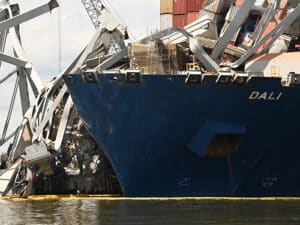
Tried to fix fuel leak alone, died in engine room fire
Written by Nick Blenkey
SEPTEMBER 1, 2016 — The U.K.’s Marine Accident Investigation Branch (MAIB) has issued a report on its investigation into an August 18, 2015, fire in the engine room of the suction dredge Arco Avon while the vessel was loading a sand cargo approximately 12 miles off Great Yarmouth, U.K.
Arco Avon’s third engineer, Anthony Jones, was badly burned in the fire and later died as a result of his injuries. As a consequence of the fire, which was extinguished following activation of the CO2 smothering system, the vessel lost all power and remained at anchor with its dredging equipment partially deployed for 9 days until it could be taken under tow and delivered to a repair facility.
The MAIB investigation concluded that:
- The third engineer was attempting to repair a failed fuel pipe when fuel, under pressure in the pipe, ignited.
- No one else on board was aware of a failed fuel pipe or that the third engineer had apparently decided to repair it.
- The third engineer was using a portable angle grinder to access the repair site, and had underestimated the risk of doing so.
- Possible contributing factors to the third engineer’s underestimation of risk were that he had neither carried out a formal risk assessment nor sought a permit to work prior to commencing the repair.
“The sad death of an experienced officer serving on a UK registered ship serves as a salient reminder of the risks that crews can be exposed to when policies and procedures designed to mitigate such risks are not followed, and recognized safe systems of work are allowed to lapse,” says a statement from the U.K.’s Chief Inspector of Marine Accidents. “Robust risk assessments and safe systems of work are important barriers that prevent marine accidents. Everyone, from the individual seafarer to the senior company executive ashore, needs to develop shared company safety cultures that make the use of risk assessments and safe systems of work an unquestioned part of life when working on board U.K; registered vessels.”
The MAIB says that safety issues raised by the incident include:
The third engineer’s decision to act autonomously without informing either the OOW or CEO was contrary to documented standing orders but was commensurate with the onboard culture of regular lone working
The fact that sparks generated by using fixed and portable angle grinders produce a hot work hazard is not currently acknowledged in marine industry guidance
The contents of International Maritime Organization (IMO) circular MSC. 1/Circ.1321, which recommends a 6 monthly inspection of fuel system pipework to be included in a vessel’s SMS, had not been formally promulgated to the U.K. shipping industry
Merchant Shipping Notices relating to personal protective equipment in engine rooms are inadequate
The Ship Captain’s medical guide gave confusing and inconsistent advice on the treatment of serious burns
Recommendations
The Maritime and Coastguard Agency has been recommended (2016/136) to more widely promulgate the contents of IMO Circular MSC.1/Circ.1321 and Bureau Veritas has been recommended (2016/138) to advise its surveyors of the contents of the circular.
Hanson Aggregates Marine Limited has been recommended (2016/137) to review and, as appropriate, amend its safety management system to ensure, inter alia, that manning levels, watchkeeping duties and communication procedures provide for safe engine room operations at all times.
Read the MAIB report HEREhttp://bit.ly/2cbOIns





Leave a Reply
You must be logged in to post a comment.